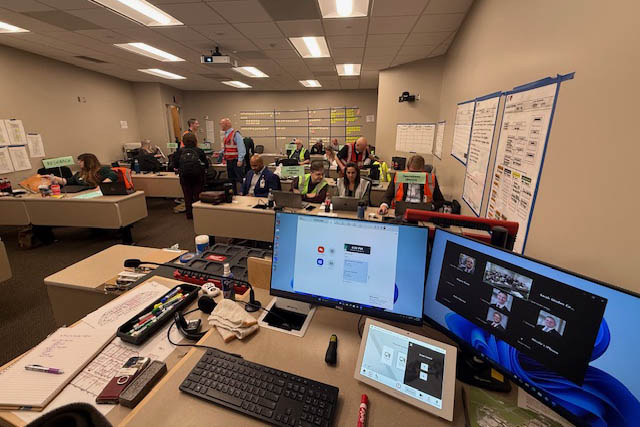UNMC Interim Chancellor H. Dele Davies, MD, Vice Chancellor for Research Ken Bayles, PhD, Diane Mack, UNMC Director of Emergency Management, and other campus leaders continue this week to work to mitigate the results of a Nov. 14 fire on the sixth floor of the Durham Research Center.
Principal investigators and researchers worked through the week to catalog materials and equipment in the areas affected by the fire and the water used to suppress it. The UNMC incident command team, led by Mack, continues to develop processes for remediation and repair of the impacted spaces.
One-hundred and forty-nine spaces, including 64 research labs and more than 5,000 pieces of equipment, affecting researchers who are receiving more than $100 million in grant funding, were impacted by the fire and sprinkler-associated flooding.
Researchers and their labs will be relocated in the coming weeks as repair work on the sixth through third floors of the Durham Research Center continues.
At a town hall Saturday for affected researchers, Dr. Bayles said teams were working to mitigate the scope of the impact but added that the damage had been extensive and that soot from the event may have compromised sensitive equipment even if no damage is immediately apparent.
“This is a frustrating situation for everyone, and we are aware of that,” Dr. Bayles said. “We are working to the best of our ability to provide affected researchers with timely information, and we will continue these mitigation efforts as aggressively as we can while being mindful of safety.”
Inventory and relocation efforts will continue into the holiday week and beyond, Mack said.
“Our top priorities are ensuring safety and continuity of operations,” Mack said. “The collaboration and resilience we’ve seen across campus have been remarkable, and our teams are doing everything possible to support researchers and restore functionality as quickly as possible.”
Dr. Davies thanked the many teams who “have come together under an Incident Command structure working around the clock” to mitigate the situation.
“We know that this is very difficult for those impacted, but the interdisciplinary teams have been doing an incredible job,” he said. “We are going to continue working hard and fast while ensuring everyone’s short- and long-term safety. Thank you for your patience, thank you for understanding that this is not an easy task, and multiple people are on it … we will get through this, and hopefully we’ll get through it better and stronger.”
